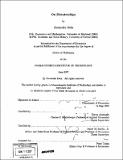On dictatorships
Author(s)
Debs, Alexandre
DownloadFull printable version (5.397Mb)
Other Contributors
Massachusetts Institute of Technology. Dept. of Economics.
Advisor
Daron Acemoglu and James M. Snyder, Jr.
Terms of use
Metadata
Show full item recordAbstract
This dissertation consists of three essays on dictatorships. The first two study the economic impact of power struggles in dictatorships. They focus on one mechanism used by dictators to remain in power, shuffling, where delegates have a short and uncertain tenure in any assignment. In these models, there is a ruler, a delegate and a population. The ruler and the delegate have a 'type', characterizing their ability as a ruler. The population can mount an insurrection, replacing the ruler with the delegate. The type of the ruler is known, while the type of the delegate is unknown to the other players. In Chapter 1, I assume that the delegate does not know his type, but can reveal it through an investment decision. I then show that shuffling is useful politically, even though it produces an economic cost, in that it reduces the delegate's incentive to invest, which prevents information about his type from being revealed. I also show that the ability to shuffle has some economic benefits, in that it assures the ruler that he can eliminate growing political threats, which induces him to encourage some investment. (cont.) In Chapter 2, I assume that the delegate knows his type and can call for an insurrection. I show that shuffling can ensure the ruler's survival when it is a punishment on the delegate. With sufficiently low payoffs, even a bad type wants to replace the ruler, so that no call for insurrection can be trusted. The same logic explains why a ruler would invest in a white elephant project to remain in power. In Chapter 3, I propose a general model of divide and rule. I show that a ruler maximizes rents by playing off divisions in the population. Typically, a ruler relies on an extreme support base, who is most afraid of the alternative regime, and invests in any technology which exacerbates popular divisions. I argue that the model offers an explanation for the negative correlation between corruption and freedom of the media, which has been widely documented. This explanation is consistent with widespread awareness of corruption in the population.
Description
Thesis (Ph. D.)--Massachusetts Institute of Technology, Dept. of Economics, 2007. "June 2007." Includes bibliographical references (p. 101-107).
Date issued
2007Department
Massachusetts Institute of Technology. Department of EconomicsPublisher
Massachusetts Institute of Technology
Keywords
Economics.